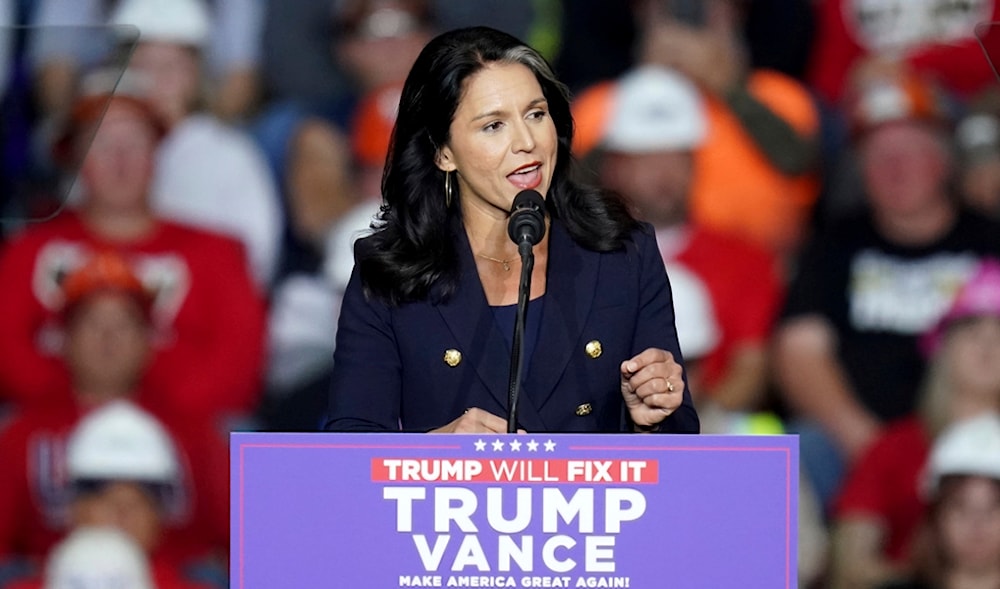Trump selects Tulsi Gabbard for intel. chief, enrages establishment
The intelligence establishment has expressed concerns regarding Gabbard's credibility and suitability for the role of intelligence chief considering her background.
-

Tulsi Gabbard speaks before Republican presidential nominee former President Donald Trump at a campaign rally at PPG Paints Arena, Monday, November 4, 2024, in Pittsburgh. (AP)
President-elect Donald Trump's selection of Tulsi Gabbard as the United States' intelligence chief has raised alarms within the national security establishment, triggering fears that the intelligence community could become more politicized.
Gabbard, a former Democratic congresswoman with limited experience in intelligence and a reputation for being more critical toward US policy on Russia and Syria, is one of several key appointments that indicate Trump might be favoring personal loyalty over qualifications as he forms his second-term administration, Reuters reported.
Current and former intelligence officials and independent experts are alleging that Trump might receive distorted views while his top officials seek to please him by withholding important information rather than ensuring or prioritizing "national security".
A Western security official noted that there could be an initial slowdown in intelligence sharing when Trump assumes office in January, potentially affecting the "Five Eyes" alliance, which includes the US, Britain, Canada, Australia, and New Zealand. The concern among US allies is that Trump’s appointments are generally seen as aligning with the "wrong direction," the official explained.
Who is Tulsi Gabbard?
Gabbard served as the US Congress Democratic representative for Hawaii from 2013 to 2021, leaving the liberal party shortly after her unsuccessful presidential run in 2020.
Since then, the politician has rebranded herself as pro-Trump, assisting the former president in preparing for his debate with his Democratic counterpart Kamala Harris on September 10.
The selection of Tulsi Gabbard, the former Democrat, and a skeptic of Biden's pro-Ukraine policies, only fuels the fire within both domestic and international intelligence circles, as well as the Republican party itself.
Gabbard was accused of parroting Russian policy ahead of and amid her departure from the Democratic Party in 2022, and also faced scrutiny for meeting with Syrian President Bashar al-Assad in 2017 despite the US cutting all ties with Syria half a decade earlier. This followed several statements she made opposing the US' intervention in the war on Syria.
Gabbard's appointment has sparked concern among intelligence officers who are uncertain about the extent to which she holds certain geopolitical views, and whether she is "misinformed" or merely aligning herself with Trump’s "Make America Great Again" supporters, according to one intelligence official.
In response, Gabbard told Fox News on Wednesday night, "Of course, there’s going to be resistance to change from the 'swamp' in Washington." She added that voters had given Trump "an incredible mandate" to shift away from Biden’s policies, though she did not provide any specific policy details.
Clashing viewpoints
Some analysts suggested that concerns over Gabbard might be alleviated by Trump’s appointment of John Ratcliffe, a former congressman and ex-director of national intelligence, as head of the CIA. While Ratcliffe is close to Trump and unlikely to challenge his policies, he is not considered an inflammatory figure and could serve as a counterbalance to Gabbard's appointment in overseeing the intelligence community.
However, other analysts warned that by surrounding Gabbard with controversial loyalists, such as Congressman Matt Gaetz for attorney general and Pete Hegseth for defense secretary, Trump is signaling his intention to reshape federal institutions without checks or balances. Democratic critics quickly criticized Gabbard, questioning her qualifications and warning that the new administration could use intelligence agencies for political purposes.
US Rep. Adam Smith, the top Democrat on the House Armed Services Committee, criticized Gabbard’s nomination, asserting that she was being appointed not for her ability to do the job, but to serve Trump’s interests.
Marco Rubio, Trump's pick for Secretary of State, defended Tulsi Gabbard’s nomination as director of national intelligence, calling it a "revolutionary pick" with potential for constructive change. However, other Republicans were more cautious. Senator John Cornyn, a member of the Intelligence Committee, emphasized the Senate's constitutional responsibility to vet nominees thoroughly before making a decision.
Gabbard will need to be confirmed by a majority in the 100-member Senate, where Republicans will hold a 52-48 majority starting in January. Given their general willingness to support the party leader, this increases the likelihood that Gabbard will be confirmed, Reuters noted.
A former US intelligence officer highlighted that both allies and adversaries are closely watching the situation, questioning what Gabbard's appointment could mean for the US' role in intelligence collection and analysis.

 4 Min Read
4 Min Read








